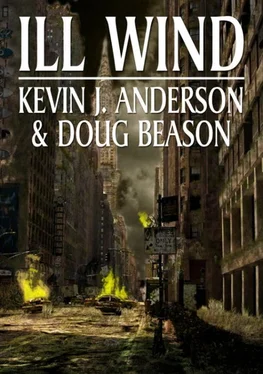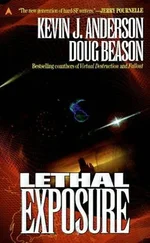Casey linked the two handcars with a pin and slid them along the track to show how easily the old vehicles moved. “We could be there in a week,” he said.
“Is that an optimistic estimate?” Henrietta asked.
“It’s just the one I’m counting on,” Casey answered.
They loaded up the handcars, tying down the carefully wrapped smallsats and their supplies for the trip. Once everything was secure, they climbed onboard the lead car.
“This really is crazy,” Todd said again. “Dr. Soo said we’re carrying a metric ton of satellites!”
“So what?” Casey said. “Let’s shove off before somebody sees us.” He stood with his back to the wind, facing east. He gripped the metal push bar. “How are your hands?”
Todd faced him, taking the opposite end of the seesaw bar. “Don’t worry about it. How’s your back?”
“Are we going to talk or go?”
Todd grasped the bar. “On three: one… two… three!” Together, they began to push.
Up and down, slowly at first as the linked cars moved forward, picking up speed. Up… down… up… down… Finally, as they gained momentum, they could feel the movement, see the rails slide by beneath them.
“We’re heading out,” Casey shouted.
Todd said, “I’ve got this sudden urge to sing ‘I’ve Been Working on the Railroad.’”
Simultaneously, Henrietta Soo and Casey Jones shushed him. Todd threw his back into the pumping.
The two handcars moved on into the night bearing the solar smallsats and three passengers. Todd could hear only the sound of the steel wheels humming along the track.
“The NSA team is here, Mr. President,” Franklin Weathersee said, rapping on the door to the oppressive, lonely room.
Jeffrey Mayeaux grumbled to himself as he sipped then put down his drink. Let’s pass a good time ! Two shots of old bourbon, neat. His wife would be sleeping by herself in a different suite down the hall, so at least Mayeaux had that much peace. Now that her social life had fallen to pieces, she had started wanting to spend time with him again, and he didn’t like the change of pace. One more mess to cope with. He’d just gotten undressed, ready for bed, when Weathersee came in to announce the meeting. What good did it do to be in charge of the goddamn country if he had to cater to everyone else’s schedules?
Weathersee’s face was outlined with deep shadows thrown from the single low-wattage bulb hanging from the ceiling. Mayeaux could see two Secret Service agents standing just outside the bedroom door.
“Thanks, Frank. I was getting sick of relaxing after a whole five minutes or so. You wouldn’t want to spoil me.”
“No I wouldn’t, sir,” Weathersee said without so much as cracking a smile.
Before communications had been disrupted with the military bases, Mayeaux would have postponed the meeting until morning. Teach them all some respect. Lordy, he hated working by the dim light almost as much as he hated getting up early in the morning. But he grabbed his bathrobe and headed for the door. If they expected him to show up in a formal suit, they had their heads up their asses.
The staff engineers had wired the elevators to work—but after what happened to that idiot Vice President in Chicago, Mayeaux never wanted to use an elevator again. He headed down the long two flights of stairs from the third-floor living quarters to the Oval Office.
Because of the enormous effort required to generate electricity with the old steam-engine equipment hauled out of the Smithsonian, there weren’t many functional lights in the White House. Over three thousand military troops were devoted to collecting wood, stoking the fires, and running the converted steam-generators around the capitol city. Generously, Mayeaux signed an executive order directing most of the electricity to go to local hospitals, but the marginal remaining supply kept the main communication lines open.
Mayeaux almost tripped on a rug in the dark. He cursed; if things got any worse, he’d have to cut a hole in the floors and install a fireman’s pole so he could whiz down to important meetings. Now wouldn’t that look presidential?
The team from the National Security Agency met him outside the Oval Office. He noticed two women in the group, but was not impressed; they both looked hardened to their duties, not the least bit attractive. The job must be getting to me , Mayeaux thought bitterly. He ushered them into the office and got right to business.
“I called you here to give me another perspective, cher . I’m not sure I can trust the bullshit my Joint Chiefs are feeding me. Don’t mince words—tell me what’s going on out there.”
The team leader, a middle-aged woman who wore no makeup at all and let her hair fall loose to her shoulders, pushed a large sheet of cardboard across his desk. She had fastened white sheets of paper to the stiff backing, drawings of the downtown Washington area. The woman pointed at the Mall extending two miles from the Washington Monument to the Capitol building.
“We’ve finished installing the underground Extreme Low Frequency antennas, Mr. President. In addition, there are five shortwave antennas around the White House.” She pointed to various locations on the drawing.
One of her aides handed her a sheaf of papers. “The ELF antenna has already raised communication with six Trident-class submarines, still underwater and still unaffected by the plague, as far as we know. That leaves ten subs unaccounted for, and three confirmed missing after the plague. We assume they have been destroyed, probably because their watertight seals were breached, but it’s not a foregone conclusion.”
“Destroyed?”
“Yes, sir. They either surfaced and the petroplague infiltrated their systems, or they were so close to the mix layer, the petroplague got to them that way.”
Mayeaux glanced over the material. Page after page of handwritten code appeared on the pages, with elaborate decoding inked in by hand after each line. Even the decoded material seemed a jumble of nonsense.
“So, can we still communicate with the surviving nuclear submarines? Can I issue them new orders?”
She nodded. “That’s right, sir. At least to a fair fraction of them. We’re still attempting to raise those assigned to ocean areas in electromagnetic voids, but we should have confirmation in a week.”
Mayeaux pushed the papers back. “What does the Navy think about this?”
The team chief spoke slowly. “We haven’t seen their complete analysis, Mr. President. Our instructions were only to collect unbiased communications traffic.”
Mayeaux thought it over for a moment. So far none of this new information conflicted with what his military chiefs had told him, but he still wasn’t convinced he had the whole story. He made a mental note to have Weathersee scare up a new list of advisors he could trust. “Okay—next topic. What’s the status of those out-of-touch military bases? Are you doing any better than the Joint Chiefs in raising them?”
The NSA staff exchanged glances. The team chief cleared her throat. “No, sir, we have not. We’re working closely with our military counterparts out in the field, and we have not yet been able to reestablish communication.”
Mayeaux shook his head. He knew he should have gulped down the rest of that damned drink before coming downstairs. “What about the communities outside the bases? Are they responding at all?”
“Well, sir, about the only thing we have are reports of looting and out-of-control fires in the larger cities: Philadelphia, Chicago, Dallas, and Denver.”
Mayeaux looked up from his desk. “What happened to LA? That was a hot spot before.”
Читать дальше












